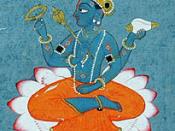Vishnu is one of the most intriguing and important gods in the Hindu religion. He is the second god in the Trimurti, or Hindu Triad, of Brahma, Vishnu, and Siva. While Brahma and Siva play the roles of creator and destroyer, respectively, Vishnu plays the significant role of preserver. This might explain his central position within the Triad because this is what is most important to worshippers. "The concept of Vishnu being the preserver of the world came relatively late in Hinduism. Presumably it sprang from two other beliefs: that men attain salvation by faithfully following predetermined paths of duty, and that powers of good and evil (gods and demons) are in contention for domination over the world."
Therefore, when there is injustice in the world, Vishnu, stepping into his role as preserver, incarnates himself into an avatar to maintain stability within the world. Vishnu only does this when the normal balance of good and evil is upset by demons.
He incarnates himself into human or animal form. Of his ten incarnations, Rama, Krishna and Buddha are the most widely known. The other avatars include Matsya the fish, Kurma the tortoise, Varaha the boar, Narasimha the man-lion, Vamana the dwarf and Parasurama the Rama with the axe. The tenth incarnation, Kalki, has yet to appear.
Interestingly, there is a monotheistic form of Hindu in which Vishnu, or one of his incarnations, is the central figure. This Hindu sect is known as Vaishnavism. The Vaishnavas are mostly warlike races of Northern India who abide by the strict institutions of caste, order and purification practices. "It is likely that a majority (75-80%) of today's Hindus would consider themselves Vaishnava, if pressed to make a distinction. Of the remainder, most would probably consider themselves Saivites," or monotheistic worshippers of Siva.
Vishnu is represented...


Thumbsup
Detailed, fascinating look at Hindu religion, well structured and organized. At parts slightly confusing, but excellent overall.
1 out of 1 people found this comment useful.